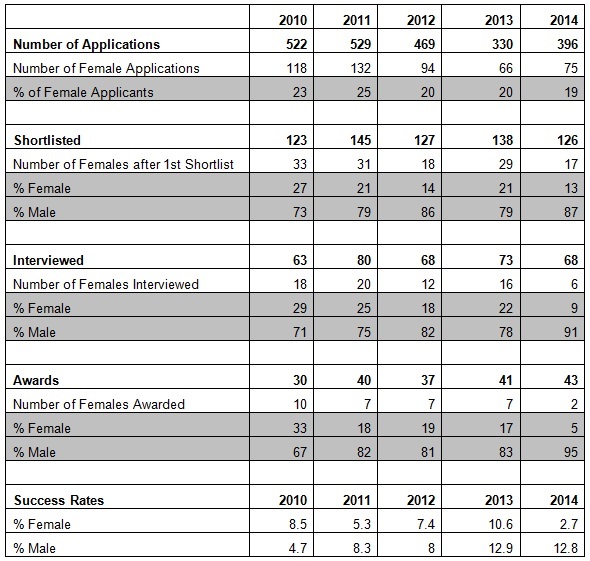The Royal Society must focus on excellence and we will not compromise on that but we are aware that too many talented individuals do not fulfil their scientific potential because of issues such as gender, ethnicity or disability.

Last Friday the Royal Society announced the latest group of researchers to be awarded University Research Fellowships (URF). That is normally a highlight of the year as it gives a degree of long term security – 5 years of funding with the possibility to extend for a further 3 years – to scientists in the earlier stages of their career, with the potential to become leaders in their field. It was a great day for the 43 scientists who were awarded grants but I, like many Fellows, was personally very disappointed to see that only two of them were women.
So how did we end up in that situation? First we need to be aware of the statistics for recent years.
University Research Fellows by gender

* 2012 was the first year after we launched our Sir Henry Dale Fellowships. These are also for early to mid career scientists but focus on biomedical science where women are better represented than in some other areas. Women have accounted for 28% (17 out of 61) of awardees on that scheme.
It is possible that this year is an anomaly as 2010 appears to have been but we cannot assume that to be the case. It is important, however, to take account of the figures over a number of years to get a true picture. It should be noted that women made up 21% of the various committees that elected the URFs this year.
This year women accounted for 19% of applications for the URF scheme but only accounted for 13% of those shortlisted, 9% of those interviewed and less than 5% of those awarded. Last year women accounted for roughly 20% at all stages of the process.
We do not know why the numbers this year are so different to previous years but I have asked for an investigation. We need to find out what happened and if we identify problems in our systems we will correct them.
On a more positive note we did announce an increase in the number of Dorothy Hodgkin Fellows last week, with the support of additional funding from the Engineering and Physical Sciences Research Council. This scheme was specifically designed to allow flexible working patterns to accommodate personal circumstances such as parenting or caring responsibilities or health issues. This flexibility is now also part of our URF scheme but the Dorothy Hodgkin Fellowships remain particularly popular with women who secured all 9 of the awards announced last week.
I believe that the low number of women awarded URFs this year sends out a bad message to young female scientists. The Royal Society must focus on excellence and we will not compromise on that but we are aware that too many talented individuals do not fulfil their scientific potential because of issues such as gender, ethnicity or disability. This is a problem across science, including at the Royal Society, and I hope that by investigating the problems we can better understand what needs to be done to improve the situation.
URF applications 2010-2014*

Update – 29/09/14
Gender breakdown for Sir Henry Dale Fellowships (PDF)
*Corrections
The URF application data table 2010-14 includes the following corrections
25/09
- % Males Success Rate in 2011 – 8.3% – previously listed as 7.8%
- Number of Females awarded in 2010 – 10 – previously listed as 11. (11 female candidates were offered awards – 1 subsequently declined)
- % Female Success Rate in 2010 – 8.5% – previously listed as 9.3%. (11 female candidates were offered awards – 1 subsequently declined)
- Number of Awards in 2014 – 43 – previously listed as 40
- Number of Awards in 2013 – 41 – previously listed as 40
- % Male Shortlisted in 2010 – 73% – previously listed as 63%
24/09
- Number of female applicants 2010 – 118 – previously listed as 120
Amendments do not affect Success Rate statistics unless otherwise stated.
